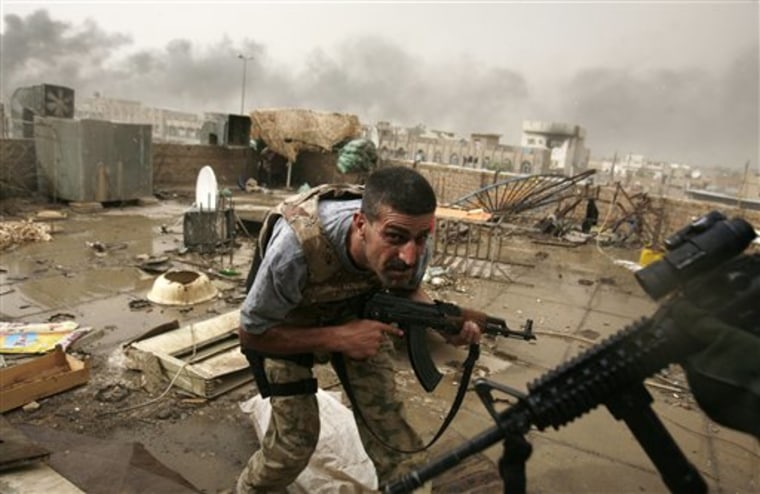A shaky cease-fire appeared to take hold Tuesday in Baghdad's Sadr City, after a cleric who brokered the deal for Shiite fighters said they would honor it even after clashes left at least 11 dead and 19 wounded.
The pact was intended to stop seven weeks of fighting between U.S.-supported Iraqi troops and Shiite extremists who have fired more than 1,000 mortar rounds and rockets into the Green Zone, home to the government and Western embassies. But the cease-fire did not start well, with clashes late Monday and early Tuesday.
Iraqi medics reported 11 killed and 19 wounded. There were women and children among the wounded, said hospital officials, speaking on condition of anonymity because they were not authorized to talk to the media. The U.S. military said Tuesday it could confirm the deaths of six militants.
In violence in northern Iraq, a roadside bombing killed five Iraqi soldiers Tuesday in Mosul, police said, also speaking on condition of anonymity because they were not authorized to talk to the media. Iraqi troops and U.S. soldiers have launched an operation against Sunni extremists there.
The Sadr City fighting and cease-fire have brought into question the authority of anti-American cleric Muqtada al-Sadr, who currently lives in Iran. Al-Sadr signed a cease-fire agreement in August, but Shiite militiamen have recently ignored those orders.
Lt. Col. Steve Stover, a military spokesman for American troops in Baghdad, said Tuesday that the fighting was caused by "special groups," Shiite factions that have broken with al-Sadr. Many are thought to be trained and armed by Iranian forces. Iran denies the allegations.
Cease-fire taking hold
Nevertheless, pro-Sadr clerics negotiated the new cease-fire and one said Tuesday it was taking hold and would be enforced.
"We signed an agreement and we are loyal to the agreement we reached," said Sheik Salah al-Obeidi, an aide to al-Sadr. "There might be some violations from both sides and we have to try to prevent them."
The deal allows Iraqi forces to take over security on Wednesday in sprawling Sadr City, the stronghold of al-Sadr's Mahdi Army militia.
Under the compromise, Iraqi forces will try to refrain from seeking American help to restore order. U.S. military officials on Sunday said they would follow the Iraqis' lead. The Sadrists rejected calls by Prime Minister Nouri al-Maliki to surrender weapons, saying Mahdi fighters have no "medium or heavy weapons."
But Stover blamed the so-called "special groups" for a failed surface-to-air missile attack on a helicopter gunship over Sadr City on Saturday. The missile was fired from an unknown location in eastern Baghdad but missed the target, he said.
The missile harmlessly exploded, and the rocket body landed in the Azamiyah neighborhood, where it was recovered by allied Sunni fighters and handed over to the U.S. military. Stover refused to release any details on the missile type.
The missile attack came a day before the four-day cease-fire went into effect.
